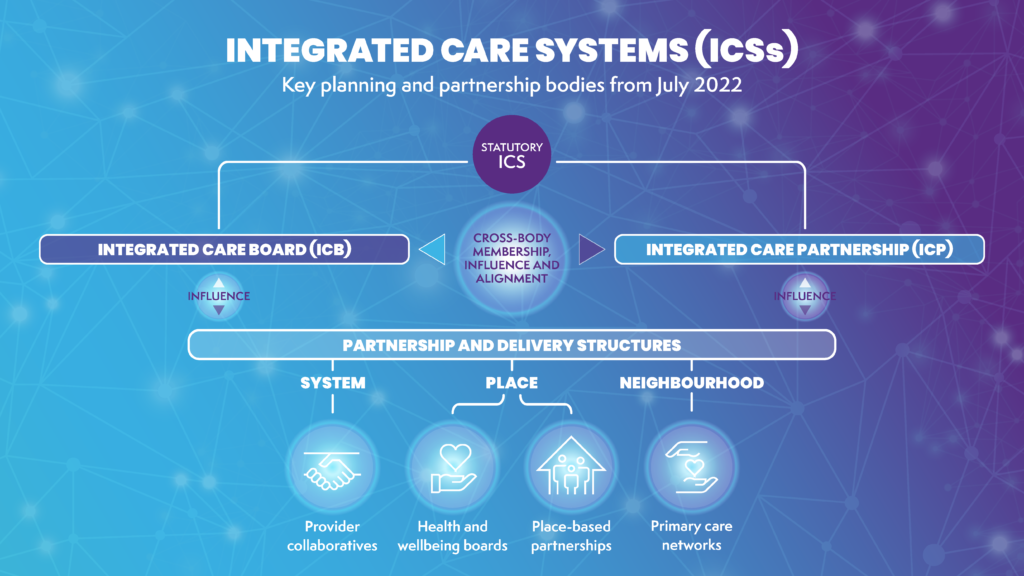ICSs: Integrated Care Partnerships and Integrated Care Boards
27 June 2022
Tags:
 In our blog series on ICSs, we’re looking at varying aspects of what they are, their structures and how they could benefit health and social care.
In our blog series on ICSs, we’re looking at varying aspects of what they are, their structures and how they could benefit health and social care.
Here, we discuss what an Integrated Care Partnership (ICP) is, in terms of membership and role, how they sit within Integrated Care Systems (ICSs) and how they work alongside Integrated Care Boards (ICBs).
What are Integrated Care Partnerships?
These operate as a statutory committee, focusing on health, public health and social care. They treat local authorities and the NHS as equal partners, helping toward the ICSs’ aim of joined-up care to improve the health and wellbeing of the population.
The memberships of ICPs will consist of ICB representatives, local authorities within the area, and partners like NHS providers, public health, social care, and VCSE organisations (voluntary, community and social enterprise).
The primary role of ICPs is to create an integrated care strategy to outline how the local population’s wider health needs will be met. When shaping the strategy, the integrated care partnership needs to involve people and communities living within the area, the VSCE sector, and the local Healthwatch. Services will not be directly commissioned by ICPs.
The right technology is key to ICS success
What are Integrated Care Boards?
A replacement for Clinical Commissioning Groups (CCGs), ICBs are responsible for the NHS planning functions and may take on some planning roles from NHS England.
A chair and a chief executive will head up ICB leadership teams. Within these, there will be NHS trust members, local councils or other authorities, GP practices and someone with expertise in mental health.
A 5-year plan will be formed around NHS services and how they will be managed in order to meet the needs of local service users. While developing this, the ICB must consider the ICP’s integrated care strategy and the joint health and wellbeing strategies by health and wellbeing boards in their area. ICBs will need to specify how they will involve and consult with the public.
Unlike ICPs, ICBs will contract with providers to provide NHS services. They will also allocate funding to the place level, in support of joint planning of some NHS and council services.
How do ICPs and ICBs work together within an ICS?

From July 2022, integrated care boards (ICBs) and integrated care partnerships (ICPs) will work together at the top of an ICS to help deliver the main objectives. Some membership parties will cross over both areas, and they will influence each other and ensure they are aligned, especially in their plans and strategies.
Both ICPs and ICBs will influence the partnership delivery structures. These consist of systems (provider collaboratives), places (health and wellbeing boards, and place-based partnerships) and neighbourhoods (primary care networks).
How will technology play a part within ICSs?
Having a digital system that can span across a large geographic area and over numerous services can cut time and save on resources like money and people. ICSs will cross multiple towns and cities so having accurate information on patients, staff and sites will be vital to their success.
Radar Healthcare is experienced in helping large Trusts and national care organisations oversee operations in their many locations from one screen, with our all-in-one risk, quality, and compliance system.











